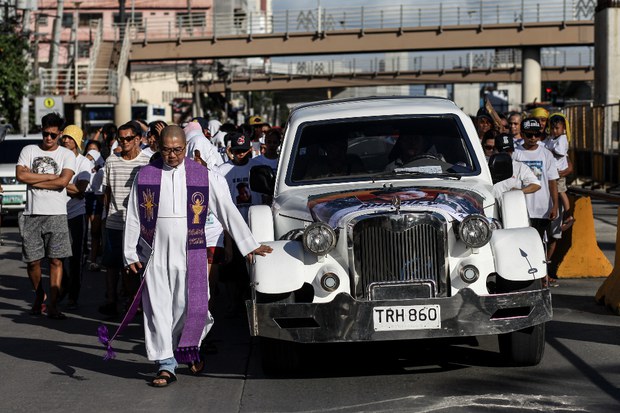Philippine Leader’s War on Drugs a Failure, Vice President Says
2020.01.06
Manila
 Relatives and friends of Mark Anthony Ruivivar, who was killed in an alleged shootout with police, join his funeral procession in Manila, Dec. 15, 2019.
Relatives and friends of Mark Anthony Ruivivar, who was killed in an alleged shootout with police, join his funeral procession in Manila, Dec. 15, 2019.
President Rodrigo Duterte’s deadly war on drugs has failed and should be scrapped, the Philippine vice president said Monday as she issued findings from her brief stint late last year as co-head of the agency that conducted the anti-narcotics campaign.
Leni Robredo claimed that the campaign, which has killed thousands of people since mid-2016, had resulted in only a tiny fraction of the country’s methamphetamine supply being seized. Robredo, who leads the political opposition, made the comments more than a month after Duterte fired her as co-leader of the agency, only 18 days into that job.
“From day one, I have asked it to be scrapped,” Robredo told a news conference.
“Very clearly, based on official data, despite the killings of Filipinos and all the money spent, the amount of shabu and drug money we’ve seized has not gone beyond 1 percent of those in circulation,” she said, using the local name for methamphetamine.
Duterte’s anti-drugs campaign focused on small-time drug peddlers who often end up dead on the streets, while leaders of big-time drug syndicates got away, the vice president said.
“Instead of chasing and killing the drug pushers on the street, we need to get to the source of the drugs – the big-time drug lords,” Robredo said. “They are the real enemies, not the ordinary citizens.”
Robredo’s comments were mainly based on information she received when she served briefly in November as co-leader of the government’s anti-drugs committee. Duterte dismissed her from the role her after she had questioned the way the anti-narcotics campaign was being carried out.
During her time with the agency, Robredo met with U.S. officials to discuss the campaign, a move that irked the president. On Monday, she said data from various government agencies implied that drugs continued to proliferate despite the bloody crackdown.
Duterte’s spokesman, Salvador Panelo, on Monday belittled Robredo’s statements.
“She implied that she discovered irregularities,” Panelo told a news conference. “It’s a dud. She did not mention (anything) new.”
Official figures indicate that more than 6,000 people have been killed in the crackdown during the past three years, but rights groups often cite a much higher death toll.
Duterte, 74, is facing two complaints for mass murder before The Hague-based International Criminal Court over the killings, which authorities had described as gunfights during legitimate anti-narcotics operations. Last year, the U.N. Human Rights Council voted to approve a resolution calling for an investigation into the killings.
International bodies react
During the weekend, the office of the U.N. High Commissioner for Human Rights invited member states, civil society groups and members of the public to submit their own analysis of the rights situation in the Philippines by the end of this month.
It vowed to protect the identities of all interviewees, while promising that all information received would be corroborated and verified.
Meanwhile, London-based rights group Amnesty International said Robredo’s revelations were a “damning insider account of the government’s murderous approach” to solving the drug problem.
“This is yet more proof that the Duterte administration should address the problem through drug rehabilitation programs rooted in communities – not through brutal policy of extrajudicial killings,” Joanne Mariner, AI’s research director for Southeast Asia, said in a statement.
“President Duterte must end Oplan Tokhang – his violent drug war policy – and initiate credible and independent investigations into past deadly operations, to obtain justice for countless victims of extrajudicial killings over the last four years,” she said.







